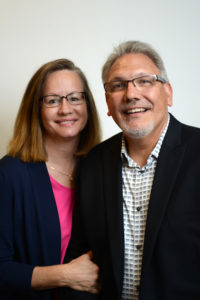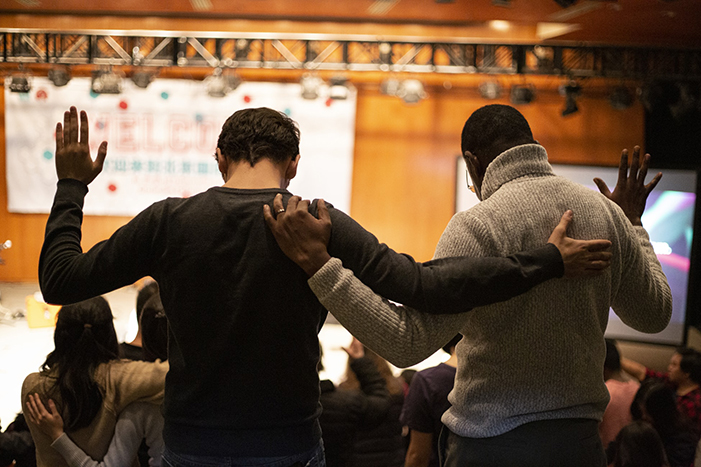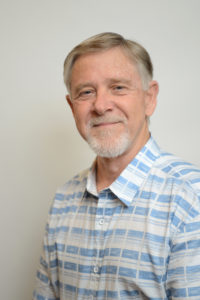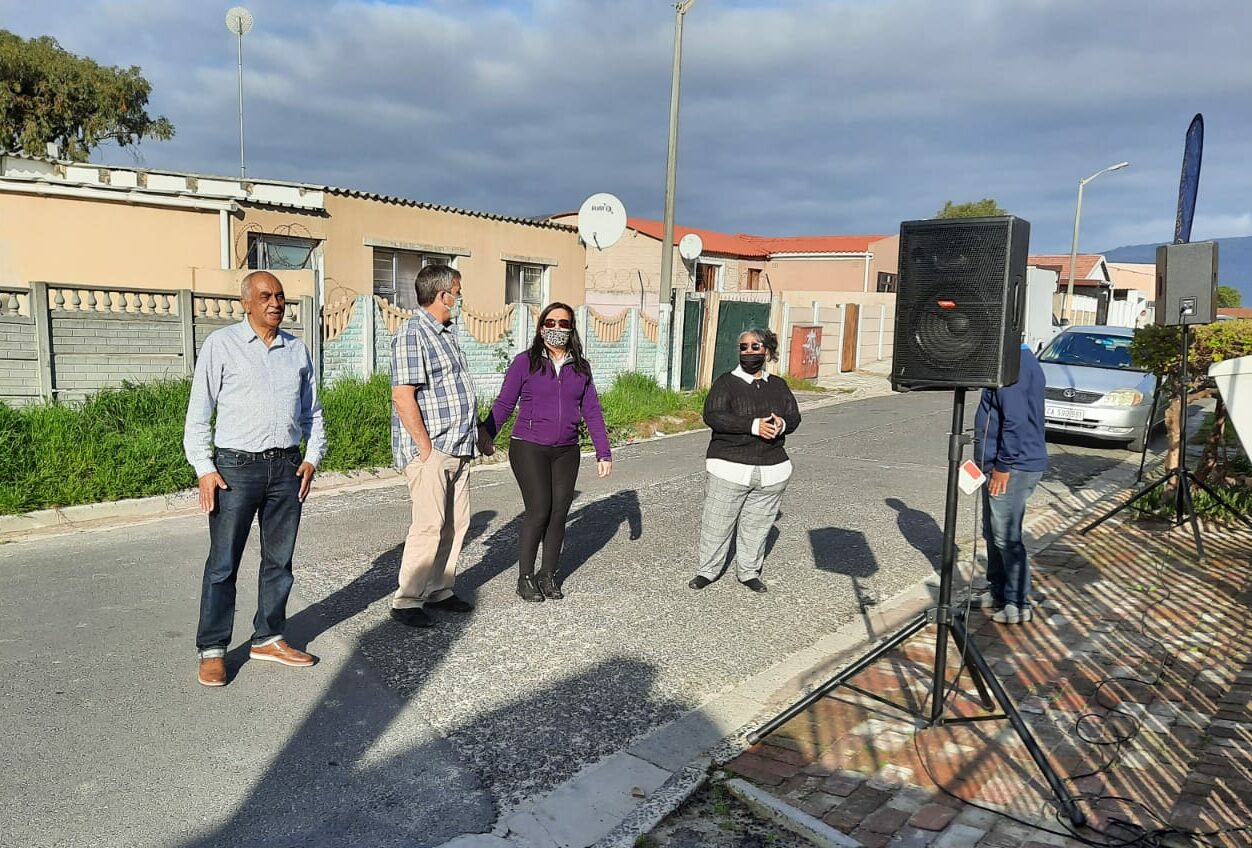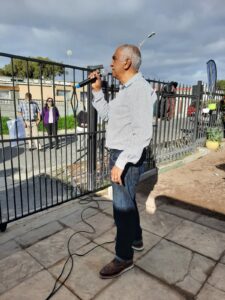
Over the last decade, we have attempted the development of younger, emerging leaders through the U.S.-based Intern and Pastoral Resident program. There has been measured success and we have several graduates of the program who have entered pastoral ministry, congregational ministry or engaged in para-church ministries.
A major weakness that was discovered is that many of these younger ones were placed in congregations that were lacking essential resources for adequately training and mentoring the young leaders. There was an expectation on the young, inexperienced leader to bring new life and growth to the church. This was unrealistic and fostered a sense of frustration and perceived failure.
A major course correction that is underway is to group interns and pastoral residents together in the life of congregations that already have established ministry avenues of Faith, Hope and Love, and there are layers of capable ministers to offer mentoring and positive ministry experiences. When younger ones are adopted into the life of churches with team-based ministry, the hope is that they will learn and grow within this existing structure and be prepared to replicate ministry beyond this educational experience with the ultimate goal of all healthy churches becoming natural ministry training centers.
I conducted an informal question-and-answer review with Dr. Kerry Magruder about the strategy for Ministry Training Centers (MTCs) across the global landscape of GCI. Dr. Magruder is Curator of the History of Science Collections at the University of Oklahoma, where he holds the John H. and Drusa B. Cable Chair in the History of Science. He was ordained as an Elder by Grace Communion Surrey Hills and is an adjunct professor with Grace Communion Seminary.
Grace Communion Surrey Hills is the first official MTC site, and it is no accident that Dr. Magruder is part of the community of leaders alongside Superintendent Michael Rasmussen, who has lived with his wife Juli in the Surrey Hills neighborhood for more than 20 years.
There are other potential MTC sites in the U.S. and overseas. Our newly appointed Development Coordinator Cara Garrity is already engaging leaders from potential sites to talk about “what could be.” She is skillfully crafting the development to happen in multiple stages to assure that progress is being made carefully and steadily. We solicit your prayers that the Spirit will guide our steps and the Lord supplies our provisions.
Q: Kerry, as an educator, can you articulate the benefits of creating a learning center like an MTC?
Training for ministry that is Trinitarian and Incarnational will be both relational and embodied. First, Trinitarian theology is relational at its core. Love is the ultimate reality: a love that is acted out in life together, that will never give up, and that is nourished in real community. Second, Incarnational theology is embodied in the full circle of created reality. Jesus took on our flesh, the fullness of our created life together. Thus, relational and embodied modes of ministry training are central to living out our Trinitarian and Incarnational theology. It was the same for Jesus, who prayed, slept, walked, worked, wept, and feasted alongside his ministers-in-training. The MTCs will ensure that ministerial learning and training does not take place on only a cognitive level, but is of a kind that unites the head and the heart in a context of community and real-world shared experience.
The MTC offers pastoral residents an experience similar to that of graduate students in major universities. Graduate Assistants devote about half of their time to academic study, in which they immerse themselves in coursework. They complement that mode of training with half-time service, for which they receive a livable wage, supporting the activities of their department. Graduate assistants work in a cohort together, learning from one another and from mentors. Such embodied, personal relations comprise a community of professional formation. This is a tried and tested mode of training adopted by universities around the world. In a similar way, the MTCs will work in synergy with academic study through GCS to enhance ministry preparation with relational and embodied practice in a community of spiritual formation.
Q: And thinking on a grander scale, what could it look like for an organization to have a global network of these centers?
GCI is a geographically-dispersed community of believers (30,000+ members spread across 66 countries with some 700 churches). The MTC model, embodied in various locations around the world, will provide the needed residential complement to GCS online education. Moreover, they will scale to a global network, united personally as people move to and fro over time, and united virtually as events and workshops are jointly hosted across multiple MTCs.
Q: Then if these centers truly express the Spirit-led dynamics of healthy church and they replicate leaders who can form church planting teams, what will that mean, not only for the mother organization but for expansion of the kingdom of God?
One of the historic strengths of GCI is an appreciation for the significance of gathering together, whether in the practice of the feasts in the earlier times, or in the regional and denominational celebrations of today. Wherever I have traveled, I have been impressed by the way that GCI members in far-flung congregations invariably recall memories of being physically present with one another. So and so in the UK worked one summer at a camp in North America with so and so from Australia, etc. From such shared experiences, long-lasting personal relationships were formed. To me, this relational intertwining of people across different regions and countries is a hidden strength of GCI. The MTCs will reinforce this denominational identity by contributing to embodied, relational connections that unite us in a profound sense of shared mission and support. The implications for church growth on a more regional level are equally profound.
Q: The Lord’s training of the Twelve is the paradigm example for ministry training. Many of our churches today also have small community groups for lay training. From the New Testament to recent times, the history of the church provides countless examples of relational and embodied approaches to ministry training. As you reflect on your own experience, were there experiences of that sort that played a role in your own spiritual formation?
One effort that greatly influenced me is the L’Abri community, founded by Francis and Edith Schaeffer in the mountains of Switzerland, which has had a widespread influence among evangelicals over the last 50 years. Francis was not kidding when he insisted that more people came to Christ “through Edith’s muffins” than through his talks and books! Although visitors came to L’Abri because they were seeking “honest answers to honest questions,” as he put it, everyone, no matter who they were or what they had come for, balanced a period of study each day with a shift in either the garden, kitchen, housekeeping, or taking care of the grounds. The life of the community was marked by prayer and worship together. Through the integration of all these activities, the multi-dimensional reality of the Lordship of Christ over all of life became manifest. Knowing God was never limited to cognitive apprehension alone.
Another example is that of Dietrich Bonhoeffer. As a teenager, growing up in rural Missouri, I had never heard of Bonhoeffer. But I was privileged one summer to attend a week-long church camp in North Carolina. This camp was not anything like the camps I knew in Missouri. Most importantly, it had a bookstore — it was the first time in my life I had ever seen a theological bookstore. Every day, in awe, I spent the lunch hour in the bookstore, poring over which books I might buy with my food money. At the end of the week, I came away with a geography of the Bible and four books by Bonhoeffer including Life Together and The Cost of Discipleship. Back in Missouri, I stumbled into my house gaunt and faint from the sacrifice of the moment, but I still have those books and treasure them to this day! The books by Bonhoeffer describe the embodied experience of ministry training for the Confessing Church in Germany during the rising years of the Nazi party. Many young ministers in training came to Bonhoeffer’s underground seminary at Finkenwalde. Books and pamphlets read in isolation during those trying times would not have been enough — only through shared life together could they be fortified for the challenges of ministry that lay ahead. Reflection upon these books was formative for me.
Q: What are some of the lessons we might learn from Bonhoeffer’s residential training center?
At Finkenwalde, Bonhoeffer deliberately put into practice an Incarnational approach to ministry training. In a helpful book on the subject, Paul House explains that Bonhoeffer’s residential center reflected his view that disembodied theological education is not enough. Paul House shared some of the insights from his study in a Beeson Podcast, where he said: “All fully Christian ministry is Incarnational… person to person… face to face… life on life….” Bonhoeffer reminded the church in his day that “God sent his Son, not a phonograph record.” Indeed, it is true that Bonhoeffer loved his phonograph records! He played recordings of African American spirituals for his students at Finkenwalde, to convey to them what true spirituality sounded like. Yet Bonhoeffer never mistook the recordings for the reality they pointed to. For the Word became flesh and dwelt among us; God did not merely produce some online media for us to watch, nor did he count on a Zoom chat as the primary way to connect with us. Paul House observes that Bonhoeffer “was asked to accept an industrial, technological, pragmatic approach to education. He rejected that trend in favor of a biblical, theological, wisdom-based approach…” In other words, in an Incarnational approach, students in fellowship, on mission day-to-day together, become responsible to one another; they learn not to see themselves as independent agents, but as walking together in the Spirit. Ultimately, ministry training is not about gaining a credential or a degree, but about becoming brothers and sisters in the body of Christ. By analogy with Finkenwalde, then, the MTCs will provide a needed complement to the online education of GCS. There’s much more in the book, but start by listening to the podcast.[1]
Q: What might we learn from other evangelical ministry training centers?
Centers of Christian community and learning have sprung up near major universities across the United States and Canada as supplements to the university experience. Charles Cotherman has written a history of the evangelical study center movement over the last 50 years, and he offers stimulating food for thought regarding the possibilities of training centers.[2] Cotherman points to James Houston, the founder of Regent College (who was also a friend of T. F. and J. B. Torrance), as providing the central model. Houston wanted education “to do away with the trappings of technocracy in favor of personal relations.” As these study centers provide evangelical students an essential residential complement to university study, so our MTCs will add an Incarnational and personal dimension to seminary study at GCS.
Q: MTC residents will be mentored in the ministry avenues of Faith, Hope and Love in the context of healthy church communities. But at the same time they will also be devoting their time to seminary study through GCS. How will residential life together help the MTC residents with their studies in GCS?
Seminary study is not an individual sport, but a team effort. Similarly, in Bandersnatch, Diana Glyer explores how “writing groups” are essential for writers, using the Inklings (C. S. Lewis, J. R. R. Tolkien, and others) as a case study. Practically everything she says about writing groups also applies to graduate students generally, including ministry training groups and seminary student cohorts. This book is full of practical wisdom and advice for pursuing a life of study together, and I have already recommended it to my graduate students here at the University of Oklahoma. Glyer deepens our understanding of how relational, embodied life together is essential to any activity — writing, study, or, we can say, ministry training.[3] I learned a lot from Glyer about how students today benefit from real-life interaction on multiple levels, from the renewed focus that arises from casual conversation over a meal together, to the importance of parallel study in proximity even when conversation is at a minimum. Glyer suggests that in community we serve as “resonators” for one another, helping each of us develop our own skills and projects and understanding of how to live out our calling. An analogy is a violin, where the wooden case resonates at the same frequency as the string — the string by itself would hardly make an audible sound, but with the resonator, our voices ring out. In MTCs, the students will be resonators for each other.
Q: Thank you, Kerry, for sharing these reflections.
It’s been a privilege. I’ve been excited and inspired about this ever since I first heard Michael Rasmussen begin to talk about GCI’s vision for a global network of MTCs!

By President Greg Williams
[1] Paul House, Bonhoeffer’s Seminary Vision: A Case for Costly Discipleship and Life Together (Wheaton: Crossway, 2015). Listen to Paul discuss his book on the Beeson podcast (for the section quoted, fast forward to 25 minutes in): https://www.beesondivinity.com/podcast/audio/beeson-podcast-episode-248-house.mp3.
[2] Charles Cotherman, To Think Christianly: A History of L’Abri, Regent College, and the Christian Study Center Movement (Wheaton: InterVarsity Press Academic, 2020); See the review at Christianity Today: https://www.christianitytoday.com/ct/2020/may-web-only/charles-cotherman-think-christianly-study-centers.html.
[3] Diana Glyer, Bandersnatch: C.S. Lewis, J.R.R. Tolkien, and the Creative Collaboration of the Inklings (Kent State University Press, 2015). Give a listen to a recent discussion with Glyer on The Habit Podcast: https://omny.fm/shows/the-habit-podcast/s2-e20-diana-glyer. Whenever Glyer says “writing group,” just substitute “ministry training cohort” and the insights transfer quite nicely to student experience in the MTC.
